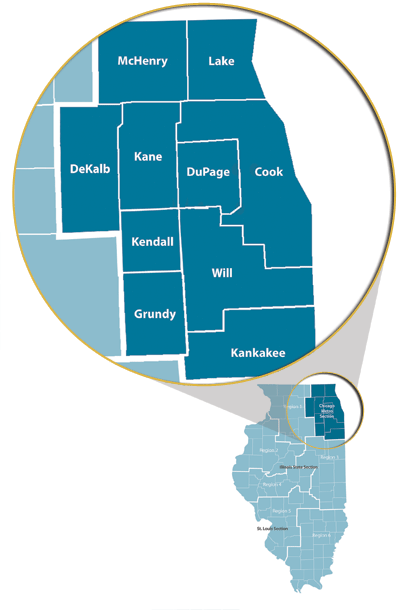5/15/24 - APA-CMS "Metra Crawl" Registration is Open! (CM | 1.5)

10-8-23 O'Hare Airport Tour

06-22-23 Aurora Bike Tour

Apr 8, 2015: An event in conjunction with DePaul's Chaddick Institute and the ACEC-IL. Whether you are new to alternative delivery methods, or experienced in the approach, this symposium will offer dynamic viewpoints and perspectives from industry experts from throughout the country.

10-8-23 O'Hare Airport Tour

Image above: The Chicago Metro Section, zoomed in.
For a state map, please click here.
The Chicago Metro Section (APA-CMS) is a sub-section of the statewide Illinois Chapter of the American Planning Association. The APA-CMS covers topics relevant to seven Chicago counties: Cook, DuPage, Will, Lake, Kane, McHenry, Kankakee, and Grundy.
Chicago Metro Section Executive Committee
CMS Executive Committee
Section Director - Justin Keller, AICP, Elevate
Assistant Director - Valerie Berstene, AICP, MKSK
Secretary - James Harris, AICP, City of Chicago
Treasurer - Carol Brobeck, AICP, Teska Associates
Past Director - Brandon Nolin, AICP, Village of Morton Grove
To contact the Chicago Metro Section, please click here.
Executive Committee Documents
Want to stay up to day on the CMS' activities? Make sure you receive updates from the CMS by joining the listserv.
Subscribe to the CMS Listserv
CMS Programs
The CMS collaborates with local planners to develop a calendar of monthly programs each year to provide educational and professional development opportunities for fellow planners, students, and affiliated professionals. Some of the CMS monthly programs are co-sponsored with affiliated organizations, such as CMAP, UIC, DePaul, and the Chaddick Institute, which reinforces APA-IL’s capacity to form partnerships that help promote the planning field and form connections with other related fields, such as development, real estate, architecture, and design. In addition to its monthly programs, CMS also works with local student organizations to sponsor networking and mentoring activities, which help up and coming planners break into the planning work world.














